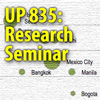Course Overview
How do you transform a nascent curiosity about a problem into a compelling research project? In this seminar we engage a week-by-week process to move students from articulating an initial idea to refining a research question and writing a convincing research design. We will employ an interactive workshop-seminar format. The goal is to seek out research questions on important, challenging and researchable problems and then experiment with mapping alternative pathways to answering these questions. Students will work closely with each other and the instructor throughout this process, reading each other's draft texts, critiquing short presentations, and providing suggestions and alternatives. We will also examine a wide range of actual research projects (both from planning and other fields) and also read a selection of texts on research design and alternative research strategies. We examine both qualitative, quantitative and hybrid/mixed-method approaches, with a particular emphasis on case study research (given its prevalence in urban research). The class will culminate in late April with formal presentations to faculty and other students (an annual urban planning tradition). Tentative date: TBA (at least three options: the morning of April 15, 17, or 22).
Students
This is a required course for second-year doctoral planning students. Students from other graduate programs are welcome. In addition to planning, previous years' students have come from architecture, SNRE and other programs.
Prerequisites
doctoral standing or permission of instructor.
Readings:
Class readings serve to assist students in understanding and designing stronger research designs and proposals (and will be available on ctools and ebrary). Students will read:
1. methods: texts on research strategies and alternative research designs
2. substantive: subject-area texts to strengthen individual research projects (student-selected readings)
3. model texts: the best in research
4.
your own writings: draft proposals and research ideas written by other students
in the seminar
I would also highly recommend that you obtain a copy of Locke, Lawrence F., Waneen Wyrick Spirduso, and Stephen J. Silverman. 2007. Proposals that work : a guide for planning dissertations and grant proposals. 5th ed. Thousand Oaks: Sage Publications. [publishers link]
Course Themes and Topics
We will address such topics as:
- Translating good ideas into good questions
- Finding compelling research projects that matter
- Mind the Gap: Defining the Research Gap (and also the limitations of that metaphor)
- Case study research
- Qualitative or Quantitative? Addressing the mismatch between numbers and ideas
- Literature Reviews: How to write an effective one that is neither too long nor boring (but instead both concisely demonstrates your knowledge of past work and effectively sets up your own project)
- Writing: just because you are a social scientist doesn’t mean you have to be a ponderous writer
- Writing a review
- The Revise and Resubmit Process: Responding to reviewers; offering and receiving criticism; making revisions
- Multiple Paths: mapping alternative strategies to answer your research question
- Using the literature to find your question
- Writing an introduction
- Writing an abstract
- Matching your research projects to your scholarly comparative advantages
Class Work / Assignments
You have two separate sets of assignments:
A. Develop and write your research proposal (in stages over the semester)
B. Short, discrete assignments on research strategies, research ethics, editing, etc.
A. Your Research Proposal: Summary of Steps to be completed
(Note: you are required to upload a copy of each step to the ctools resources page by Monday evening before the class due date):
- Research question/problem statement (ca. 3-4 pages) -- Jan 21
- Literature review (ca. 4-6 pages) -- Feb 4
- Methods (ca. 5-6 pages) -- Feb 18
- Statement of impact/importance of research (ca. 1-2 pages) -- Feb 25
- Draft #1 of full proposal (ca. 25-30 pages) -- Mar 11
- Draft #2 of full proposal -- Apr 1
- Final version presented to a public audience (April 15, 17, or 22)
B. Short, discrete assignments on research strategies, research ethics, editing, etc.
Assignments will include:
- dissertation review: locate a dissertation (online through Proquest) on a topic related to your own project and write a short review/evaluation.
- review of a literature review: locate a literature review (e.g., from a journal such as Journal of Planning Literature, etc.) and write a 2-3 page critique.
- Responsible Conduct in Research and Scholarship Modules (from Rackham)
- editing scholarly text: the instructor will provide a short excerpt (e.g., several paragraphs) of a turgid academic text. Edit and rewrite for clarity and brevity.
- models of great research: Identify an example of what you think is a great research project (in article or book form) that you would like to emulate or use as a role model/exemplar for your own work. We will begin to assemble a list. You will then "reverse engineer" a hypothetical brief research proposal that would have led to the book or article (articulating their RQ, method, literature, statement of impact/importance of research).
Questions? Feel free to contact me. |
